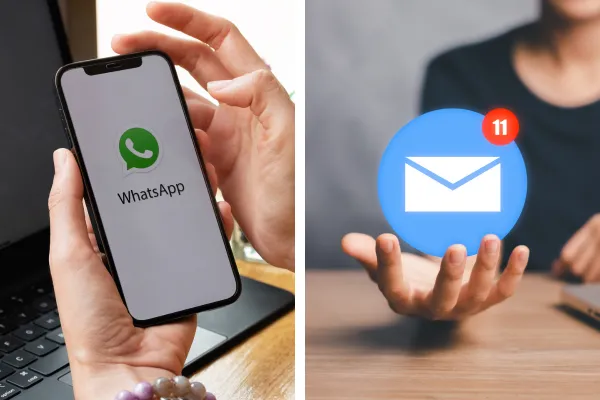Blog Posts

WhatsApp Marketing vs. Email Marketing: A Comparative Guide
WhatsApp Marketing vs. Email Marketing: A Comparative Guide
In today's digital landscape, where our smartphones serve as steadfast companions, messaging has cemented its place as a crucial facet of marketing. It's not so much about where we are, but about where our consumer's attention is - and often, it's within the chat bubbles or email inboxes that are perennially aglow with notifications.
But for small business owners and digital marketers, the real conundrum lies in this very comparison – WhatsApp Marketing versus Email Marketing? Which platform delivers better engagement and, more importantly, better ROI given the often limited resources at hand? This detailed comparative guide navigates the intricacies of these two powerful channels to provide insights that can lead your marketing approach toward success.
WhatsApp Marketing: The Power of Personalized Conversations
WhatsApp, with its user base exceeding two billion, presents a goldmine for marketers looking to engage their audience through an intimate communication channel.
Instant Engagement at Scale
The sheer percentage of messages read within minutes on WhatsApp is a tantalizing metric for marketers. Leveraging tools like broadcast lists and group chats, businesses can instantly connect with a vast audience. The key to success here is in the personalized approach; messages that feel exclusive and directed towards the recipient yield higher open rates and engagement.
Strategies that Resonate
For businesses, establishing a presence on WhatsApp isn't just about setting up a profile. It's about crafting thoughtful strategies that utilize features like status updates, one-on-one chats for customer service, and the underutilized but powerful WhatsApp Business API for integrated solutions that streamline sales and support.
Real-World Triumphs
Consider the local bakery that's using WhatsApp for order confirmations and personalized promotions, resulting in a 20% increase in orders. Or the NGO that has seen a 30% uptick in donations from regular supporters, thanks to real-time updates on donation drives. These are success stories that underline the potential of WhatsApp marketing in fostering meaningful connections and driving results.
Email Marketing: The Personal Touch at a Global Scale
Email marketing, the veteran of digital marketing, continues to be a formidable tool in the right hands, offering a personal touch on a global scale.
Congregation of Strategy and Data
With smart segmentation and automated workflows, email marketing allows businesses to deliver content to a tailored audience based on behaviors, interests, and more. The tracking and analytics available provide invaluable insight into what resonates with your subscribers, making it a cyclical process of constant refinement.
The Power of the Drip
Email's strength in delivering personalized content over time through drip campaigns should not be underestimated. Sequential marketing automation workflows can nudge prospects closer to conversion with a steady trickle of information, offers, and calls to action.
Trust Builders and Sales Drivers
For many, the inbox is a sacred space, implying that subscribers are already somewhat invested. By leveraging this trust, email marketing becomes a potent tool for not only driving sales but for building brand loyalty.
Case Studies that Echo Success
Take the e-commerce startup that improved its click-through rate by 25% through targeted email campaigns based on customer behavior and preferences. Or consider the consulting firm that grew its client base by 15% through email newsletters that highlighted industry insights and project successes. These are examples that illustrate the enduring impact of email marketing when executed with strategic finesse.
Cost-Effectiveness and ROI
When it comes to cost, WhatsApp Marketing can certainly appear cheaper, especially if you're comparing standard texting rates to email sending fees. However, the true cost lies in the intricacy of your campaigns.
While email marketing may require you to spend a bit more on tools and potentially more time curating your content for a polished newsletter, the ROI can be substantial. Research consistently shows that email marketing delivers the highest ROI of any digital channel.
Reach and Engagement
WhatsApp Marketing boasts impressive engagement statistics, but its reach can be limited by the need for user consent to join a contact list. Email, on the other hand, offers a broader reach with a lower barrier to entry for sign-ups.
Building a Subscriber Base
For businesses just starting, the challenge of building an engaged WhatsApp audience can be formidable. In contrast, email sign-ups can be incentivized and often don't require the same level of trust from the subscriber, allowing an easier and faster build of your list.
Maintaining High Engagement
WhatsApp's high engagement rates are hard to ignore, but maintaining such levels can be tough, especially with regulations that prevent the spammy tactics often associated with email marketing. On the other hand, email marketing requires a trustworthy sender's reputation to ensure deliverability.
Conversion Rates and the Buyer's Journey
Both WhatsApp and email can play significant roles in the buyer's journey, but the way they guide prospects toward conversion is quite different.
The Path to Purchase
WhatsApp excels at facilitating quick conversations that can lead to immediate sales or support resolutions. Its conversational nature makes it ideal for securing last-minute sales, providing instant customer service, or even for nurturing customers through staged interactions.
Email's Nurturing Nuance
Email, with its ability to guide prospects through a more prolonged and structured campaign, is excellent for those in the consideration or decision stage. By delivering educational content or special offers over time, email marketing has the potential to influence a more deliberate purchase decision.
Considerations for Small Business Owners
Small business owners need to think strategically and pragmatically about their resources when deciding between WhatsApp and email marketing.
Budget and Resource Realities
Given the often limited budget and manpower, small businesses must consider not just the cost, but also the efficiencies each channel provides. Building a WhatsApp strategy might be more time and resource-consuming at first, while email marketing might require upfront financial investment in the right tools and potentially outsourced copywriting or design work.
Audience Demographics and Preferences
Understanding your audience is key. If your target demographic consists of younger, more mobile-focused users, WhatsApp might be your go-to option. However, don't discount the value of email, especially if your audience is professionals or an older demographic who are more accustomed to and comfortable with email as a communication channel.
Integration with Existing Systems
For small businesses with existing CRM and e-commerce systems, the decision should also be informed by the ease of integration. Both WhatsApp and email marketing need to flow seamlessly with your current systems to ensure a consistent, efficient, and measurable customer experience.
Conclusion: Which Path to Choose?
The choice between WhatsApp Marketing and Email Marketing is not clear-cut; it is a nuanced decision that should be guided by your business goals, your audience's behaviors, and your capacity to execute. Each platform has its unique strengths and can complement each other in a well-rounded marketing strategy.
For businesses aiming for instant, intimate engagement with their audience, WhatsApp Marketing offers a direct and powerful medium. For those looking to leverage sophisticated automation and analysis to engage with a larger audience over time, email marketing remains indispensable.
In the end, it's not just about which is better, but how you can leverage both to create a comprehensive digital marketing strategy that resonates with your audience and drives growth for your business.
If you're intrigued by the potential of WhatsApp Marketing for your business and are eager to explore how it can drive engagement and growth, click here. Discover how this dynamic platform can elevate your marketing strategy and create direct, impactful connections with your audience.
Start Increasing Your Sales with Spandize Today!
